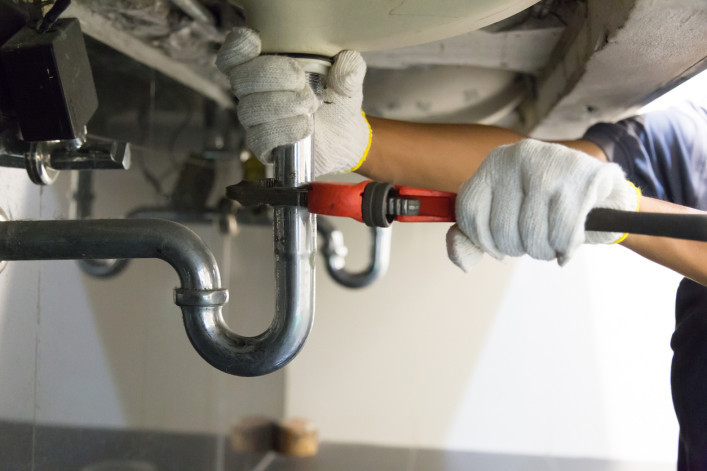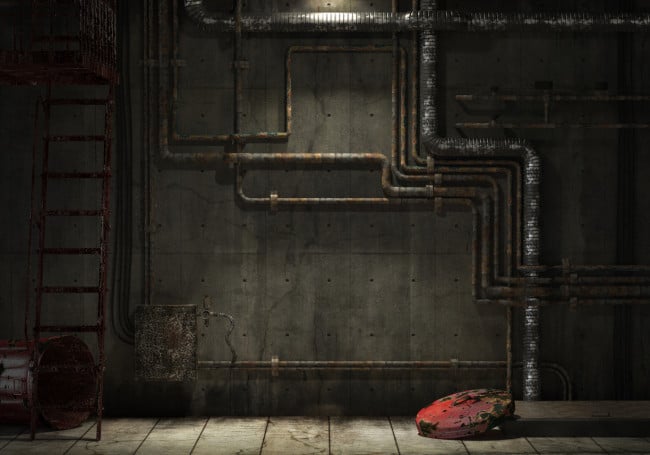The 7 best ways to get your NYC landlord to make repairs and get them done faster
- Putting your request in written form is usually the best way to start
- Slipping the super some cash in advance can get the work done faster
- If you're out of options, calling 311 may get violations issued to your building

If your landlord isn’t responding to your repair requests, here’s how to move the process along.
iStock
Whether it’s a leaking faucet or a broken appliance, it’s inevitable—especially if you rent for a long time in New York City—that you will find yourself asking a landlord to make repairs. Fortunately there are laws and regulations that require building and apartment owners to make repairs when you report something is broken, but that doesn’t necessarily mean it will be done immediately.
Typically a landlord’s responsiveness depends on how efficiently your super or management company runs the building, whether or not you live in a rent-stabilized apartment, and how eager your landlord is to keep you as a tenant.
Even so, there are ways you can speed up repairs. Putting the request in writing is a good starting point. If you live in a large rental building, tipping the super can help, as can teaming up with other tenants who are dealing with similar problems. If that fails, you can file a complaint, which can trigger a violation.
[Editor's note: A previous version of this article was published in July 2024. We are presenting it again in case you missed it.]
If you're having trouble getting repairs made, here are seven tried-and-true tactics to help move the process along.
1) Put a repair request to your landlord in writing
Rule number one of dealing with landlords is that you should always put your requests and complaints in writing, especially for a big repair job. (Ideally by certified mail, so no one can claim they lost your letter or that your email got caught in the spam folder.) This serves to create a paper trail in the event you end up taking them to court. It also has a way of getting their attention, fast.
If there is a complaint book in the building, log your problem there. However, writing a letter to the super or to the managing agent and copying in the other makes it official and will get a better response.
Some leases also have provisions for how the landlord prefers to be contacted, so check yours before you reach out, and act accordingly. If you have multiple, documented attempts to get in touch with the landlord to solve a problem, this will work in your favor in any kind of legal dispute down the road.
2) Tip the super to get repairs done faster
It might seem unfair to have to tip someone simply to do their job, but the fact remains that there's no better way to get a super's attention than a little cash, even if it just means being moved to the head of the line above the 20 other tenants clamoring for attention.
A tip can also get your repair done better—inducing, for example, your super to replace your broken fridge with a new one instead of the cast-off in the basement.
Tipping your building staff over the holidays is standard practice in NYC, so don’t be surprised if your super becomes more responsive to your requests during the final months of the year.
3) Call 311 about dangerous safety violations in your building
If you've exhausted your options and are dealing with something arguably dangerous to health, life, and safety (such as vermin, dangerous electrical wires, unreasonable noise, leaks, damaged ceilings, or mold), call or go online to 311.
Here's what happens when you do: The city will send out an inspector from either Housing Preservation & Development, the Department of Buildings, or even the Department of Health, depending on the type of problem.
Your landlord may be required to pay a fine or to show up in court to contest the violation. In either case, your landlord will have to certify that the violation has been corrected.
The downside: Your repair may be taken care of, but this will not endear you to your landlord, which can be a problem when it’s time to renew a lease for a market-rate apartment. But take heart: Good Cause eviction law protects many tenants in market-rate rentals from steep rent increases, so it's important to determine if your apartment is covered by this law.
Tenants in rent-stabilized apartments have additional protections and can only have their rent increased by the percentage set by the Rent Guidelines Board and they also have a right to a lease renewal for a one- or two-year term.
A slight variation on this theme: If you're in a rent-stabilized or rent-controlled apartment, you can file a reduction of services complaint with the Division of Housing and Community Renewal.
You can use this for services like discontinued amenities, but also problems like heat, hot water, or repairs. If conditions are really bad—like no heat—the rent can be rolled back to $1. But typically the rent will be rolled back to whatever it was before the most recent increase and frozen at that amount until the landlord restores all services.
4) You may have to take your landlord and the city to court
If you’re taking this route, it's because your apartment violates the warranty of habitability, the agreement that landlords must provide you with a safe and livable apartment—and you’ve exhausted all of your other options
The city categorizes violations into three groups. Class A is a non-hazardous condition, such as a minor leak or a small area of peeling paint when there are no children under the age of 6. Class B is a hazardous violation, like the absence of a self-closing security door to the building or the presence of roaches or bed bugs; and C is an immediately hazardous condition, including lack of heat, hot water, electricity, or the presence of rodents.
If the city has already issued a violation, you can look up its classification on the relevant agency's website. If not, check out the Housing Maintenance Code to see how your problem will likely be classified.
If your problem falls into one of these categories, you can file an HP Proceeding (also known as an HP Action), which will certainly get the landlord’s attention. (“HP” stands for “Housing Part,” which is where tenants can sue their landlords.) An HP Proceeding is a lawsuit that you bring in housing court against your landlord for failing to comply with the law and against the City of New York because it has failed to enforce the law.
Housing court clerks help prepare the necessary papers to start the HP Proceeding. Since you will not need a lawyer, it costs you practically nothing. Taking this route also has the advantage of keeping your name off housing court documents although landlords cannot refuse to rent to you because they see your name on housing court documents.
When the case appears on the court calendar, the attorneys for the city will prosecute the case for you and force the landlord to make the repairs that the inspector confirms are violations.
These cases usually get resolved with the landlord either adjourning the case to get more time to make repairs before the judge hears the case or by the parties signing a stipulation of settlement that requires the landlord to make the repairs either immediately for Class C violations, within 30 days for Class B violations, or within 90 days for Class A violations.
Fines can be significant if the landlord does not make the necessary repairs. They typically range from $50 per day after 90 days for Class A violations to $250-$500 per day, imposed immediately, for Class C violations.
The court will enforce fines not only with a money judgment against the landlord, but if the landlord persistently fails to make the repairs, the court may punish the landlord for contempt.
5) When to withhold rent to force a landlord to make repairs
While you risk winding up in housing court, withholding rent is sometimes the best—and perhaps fastest—way to really get a landlord's attention.
If you sent the landlord a letter asking for the repair, the city issued the landlord a violation, and you withhold rent, you may succeed on a warranty of habitability claim, which is a defense for non-payment of rent where conditions are dangerous to life, health, or safety. That's why having good photos to document conditions are important too.
Class C violations stand the best chance of convincing a court that you're entitled to a significant rent abatement. You don't need a lawyer to pull this one off, but you will want extensive documentation of the problem to strengthen your case in court. Take pictures of the problem, and keep a calendar on which you track the conditions on a daily basis, and log evidence of your communications or efforts to communicate with the landlord.
Even with a Class C violation, your case is not a slam dunk.
The landlord can prevail by showing that you created the condition or by claiming that you did not provide access and prevented the landlord from making the repair. Usually what happens is the attorney will try to pressure the landlord to make the repairs and get the parties to agree to an access date in a settlement.
Keep in mind that your lease probably has a legal fees clause that will allow the landlord to recover his expenses if he wins so save this option for the most extreme cases. If you win, you get to recover your legal fees.
6) Organize your neighbors to get work done
If the problem you're facing is building-wide as opposed to something wrong in your individual apartment, remember there's strength in numbers. Try to get your neighbors to work as a group to get the issue resolved.
Your best bet is to form a tenants association and approach your landlord as a unified group. If the entire building is making a demand and threatening legal action or withholding rent payments, your landlord is much more likely to sit up and pay attention.
7) Do repairs yourself and get reimbursed by your landlord
This option may seem straightforward enough: Get an estimate for repairing the problem, send it to your landlord, and request the repair in writing. If your request is ignored, pay for it yourself, and deduct it from your next rent check.
This is a risky option, because landlords will likely argue they can get it done for less. If the landlord rejects your attempt at taking the cost of repairs out of your rent check, there's a chance you wind up in housing court and have to defend your actions. Some courts will allow you to deduct the cost of ordinary repair jobs that you have done yourself. You should be able to show documentation of repeated repair requests to your landlord and their refusal.
Know your DIY limits and don't try anything blatantly unsafe or illegal.
If you do move forward with this option, copies of the bills and proof of payment are critical to your defense, along with documentation of the condition, notice to the landlord that the condition existed (make copies of any letters and send them certified mail, saving proof of mailing)—and that the landlord failed or refused to correct the condition.
Of course there are certain repairs you should never even attempt, like electrical work, work that requires you to open up the walls, anything structural or involving a gas line. In addition to safety concerns, you risk legal action and eviction.
—Earlier versions of this article contained reporting and writing by Virginia K. Smith, Donna M. Airoldi, and Emily Myers.






























